Related Research Articles
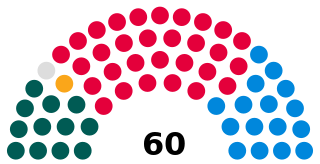
The Senedd, officially known as the Welsh Parliament in English and Senedd Cymru in Welsh, is the devolved, unicameral legislature of Wales. A democratically elected body, it makes laws for Wales, agrees certain taxes and scrutinises the Welsh Government. It is a bilingual institution, with both Welsh and English being the official languages of its business. From its creation in May 1999 until May 2020, the Senedd was known as the National Assembly for Wales.

Haradanahalli Doddegowda Deve Gowda is an Indian politician from the state of Karnataka. He served as the 11th prime minister of India from 1 June 1996 to 21 April 1997. He was previously the 14th Chief Minister of Karnataka from 1994 to 1996. He presently is a Member of Parliament in the Rajya Sabha representing Karnataka. He is the National President of the Janata Dal (Secular) party.
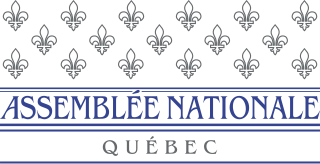
The National Assembly of Quebec is the legislative body of the province of Quebec in Canada. Legislators are called MNAs. The King in Right of Quebec, represented by the Lieutenant Governor of Quebec and the National Assembly compose the Legislature of Quebec, which operates in a fashion similar to those of other Westminster-style parliamentary systems. The assembly has 125 members elected first past the post from single-member districts.

The prime minister of Vietnam, officially styled as the Prime Minister of the Government of the Socialist Republic, is the head of government of Vietnam who presides over the meetings of the Central Government. The prime minister directs the work of government members, and may propose deputy prime ministers to the National Assembly.
A Member of Provincial Parliament (MPP) is an elected member of the Legislative Assembly of the Canadian province of Ontario. Elsewhere in Canada, the titular designation "Member of Provincial Parliament" has also been used to refer to members of the Legislative Assembly of Lower Canada from 1791 to 1838, and to members of the Legislative Assembly of Quebec from 1955 to 1968.

The prime minister of Pakistan is the head of government of the Islamic Republic of Pakistan. Executive authority is vested in the prime minister and his chosen cabinet, despite the president of Pakistan serving as the nominal head of executive. The prime minister is often the leader of the party or the coalition with a majority in the lower house of the Parliament of Pakistan, the National Assembly where he serves as Leader of the House. Prime minister holds office by virtue of their ability to command the confidence of the National Assembly. The prime minister is designated as the "Chief Executive of the Islamic Republic".

The president of the Socialist Republic of Vietnam is the head of state of Vietnam, elected by the Vietnam National Assembly from delegates of the National Assembly. Since Vietnam is a single-party state, the president is generally considered to hold the second highest position in the political system, formally after the General Secretary of the Communist Party of Vietnam. In addition, the president appoints the head of government, the Prime Minister. As head of state, the President represents Vietnam both domestically and internationally, and maintains the regular and coordinated operation and stability of the national government and safeguards the independence and territorial integrity of the country.
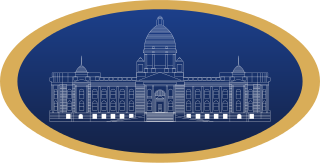
The National Assembly is the unicameral legislature of Serbia. The assembly is composed of 250 deputies who are proportionally elected to four-year terms by secret ballot. The assembly elects a president (speaker) who presides over the sessions.

The National Assembly is the lower legislative house of the bicameral Parliament of Pakistan, which also comprises the Senate of Pakistan. The National Assembly and the Senate both convene at Parliament House in Islamabad, the capital of Pakistan. The National Assembly is a democratically elected body consisting of a total of 342 members who are referred to as Members of the National Assembly (MNAs), of which 272 are directly elected members and 70 reserved seats for women and religious minorities from all over the country. A political party or a coalition must secure 172 seats to obtain and preserve a majority.

The Grand National Assembly of Turkey, usually referred to simply as the TBMM or Parliament, is the unicameral Turkish legislature. It is the sole body given the legislative prerogatives by the Turkish Constitution. It was founded in Ankara on 23 April 1920 in the midst of the National Campaign. This constitution had founded its pre-government known as 1st Executive Ministers of Turkey in May 1920. The parliament was fundamental in the efforts of Mareşal Mustafa Kemal Atatürk, 1st President of the Republic of Turkey, and his colleagues to found a new state out of the remnants of the Ottoman Empire.

The Parliament of Pakistan is the federal and supreme legislative body of Pakistan. It is a bicameral federal legislature that consists of the Senate as the upper house and the National Assembly as the lower house. According to the Constitution of Pakistan, the President of Pakistan is also a component of the Parliament. The National Assembly is elected for a five-year term on the basis of adult franchise and one-man one-vote. The tenure of a Member of the National Assembly is for the duration of the house, or sooner, in case the Member dies or resigns. The tenure of the National Assembly also comes to an end if dissolved on the advice of the Prime Minister or by the president in his discretion under the Constitution.

The prime minister of Cambodia is the head of government of Cambodia. The prime minister is also the chairman of the Cabinet and leads the executive branch of the Royal Government of Cambodia. The prime minister is a member of parliament, and is appointed by the monarch for a term of five years. Since 1945, 36 individuals have served as prime minister; 32 as official prime ministers, and 4 in acting capacities.Hun Sen, of the Cambodian People's Party, has been the incumbent prime minister since 1985. He served from 1985 to 1993 and was Second Prime Minister from 1993 to 1998 alongside Norodom Ranariddh (1993–1997) and Ung Huot (1997–1998). Elected as prime minister in his own right in 1998, he is the longest serving prime minister in Cambodian history.

The National Assembly of the Socialist Republic of Vietnam is the national legislature of the Socialist Republic of Vietnam.

The Federal Parliament of Nepal is the bicameral federal and supreme legislature of Nepal established in 2018. It consists of the National Assembly and the House of Representatives as parallel houses.
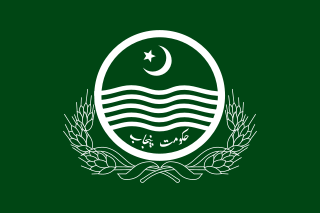
The Provincial Assembly of the Punjab is a unicameral legislature of elected representatives of the Pakistani province of Punjab, which is located in Lahore, the provincial capital. It was established under Article 106 of the Constitution of Pakistan, having a total of 371 seats, with 297 general seats, 66 seats reserved for women and 8 reserved for non-Muslims.
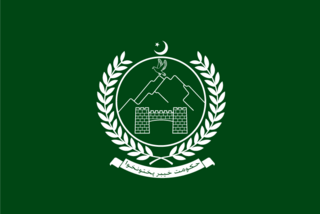
The Provincial Assembly ofKhyber Pakhtunkhwa is a unicameral legislature of elected representatives of the Pakistani province of Khyber Pakhtunkhwa, which is located in Peshawar, the provincial capital. It was established under Article 106 of the Constitution of Pakistan previously having a total of 124 seats, with 99 general seats, 22 seats reserved for women and 3 seats for non-Muslims. After the merger of FATA with the Province of Khyber Pakhtunkhwa, the total seats rose from 124 to 145 by adding 16 general seats, 4 seats reserved for women and 1 reserved for a non-Muslim.

Sivakumar s/o Varatharaju Naidu, better known as V. Sivakumar, is a Malaysian politician who has served as the Minister of Human Resources in the Pakatan Harapan (PH) administration under Prime Minister Anwar Ibrahim since December 2022 and the Member of Parliament (MP) for Batu Gajah since May 2013. He served as Member of the Perak State Legislative Assembly (MLA) for Tronoh from March 2008 to May 2013. He also served as Speaker of the assembly from April 2008 to May 2009. He is a member of the Democratic Action Party (DAP), a component party of the Pakatan Harapan (PH) and formerly Pakatan Rakyat (PR) opposition coalitions. He has also served as the Deputy Secretary-General of DAP since November 2017. He is also presently the sole minister of Indian ethnicity.

Nguyễn Xuân Phúc is a Vietnamese politician currently serving as the President of Vietnam, one of the highest-ranked officials in Vietnam along with Nguyễn Phú Trọng, General Secretary of the Communist Party of Vietnam. Nguyễn Xuân Phúc ranked 2nd in the Communist Party's 13th Politburo behind Nguyễn Phú Trọng and was ranked 3rd in the 12th Politburo. Nguyễn Xuân Phúc is also a full member of the National Assembly, serving in its 11th, 12th, 13th and 14th terms. He was elected to the post by the National Assembly of Vietnam on 5 April 2021 after serving 5 years as Prime Minister of the country. Nguyễn Xuân Phúc became a member of the Communist Party of Vietnam on 12 November 1983.
Mgcini Tshwaku is a South African politician who has served in the South African National Assembly as a member of the Economic Freedom Fighters since 2017. Prior to serving in parliament, he was a Member of the Gauteng Provincial Legislature between 2014 and 2017.
Russel Nsikayezwe Cebekhulu is a South African politician who has been an Inkatha Freedom Party Member of Parliament (MP) since 2015 and previously from 2009 to 2014.